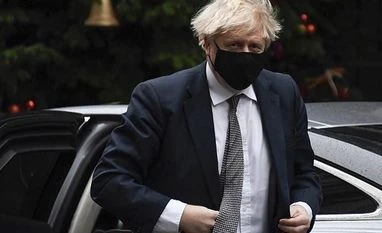British Prime Minister Boris Johnson on Tuesday spoke to Prime Minister Narendra Modi to express his regret over not being able to visit India as planned for the Republic Day on January 26 due to the growing health crisis created by the new variant of coronavirus in the UK.
Johnson's call with Modi came a day after he addressed the nation in a televised address to plunge the country into a new stay-at-home lockdown as his medical chiefs warned that the National Health Service (NHS) was under threat of being overwhelmed by the rising infection rates.
Johnson has indicated that his India visit would take place during the first half of this year and before the G7 Summit presided over by the UK, planned for later this year.
"The Prime Minister spoke to Prime Minister Modi this morning, to express his regret that he will be unable to visit India later this month as planned," a Downing Street spokesperson said.
"In light of the national lockdown announced last night, and the speed at which the new coronavirus variant is spreading, the Prime Minister said that it was important for him to remain in the UK so he can focus on the domestic response to the virus,” the spokesperson said.
The two leaders underlined their "shared commitment" to the bilateral relationship, and to continuing to build on the close collaboration between India and the UK – including in response to the pandemic.
“The Prime Minister said that he hopes to be able to visit India in the first half of 2021, and ahead of the UK's G7 Summit that Prime Minister Modi is due to attend as a guest,” the spokesperson said.
Johnson accepted Modi's invitation to be the chief guest at the Republic Day parade on January 26 last month.
While accepting Modi's invitation, Johnson had extended an invite to the Indian Prime Minister to attend the UK's G7 Summit as one of three guest nations alongside South Korea and Australia – with a focus on his declared ambition to work with a group of “like-minded democracies” to advance shared interests and tackle common challenges.
Last month, Johnson had written to Modi to formally accept his invitation to visit India as Chief Guest at the Republic Day Parade, which was to mark his first major bilateral visit since taking office in 2019 and the first since Britain's formal exit from the European Union (EU) at the end of the Brexit transition period on December 31, 2020.
“I am absolutely delighted to be visiting India next year at the start of an exciting year for Global Britain, and look forward to delivering the quantum leap in our bilateral relationship that Prime Minister Modi and I have pledged to achieve,” Johnson said at the time.
“As a key player in the Indo-Pacific region, India is an increasingly indispensable partner for the United Kingdom as we work to boost jobs and growth, confront shared threats to our security and protect our planet,” he said.
It followed Modi's invitation to Johnson in a phone call in November 2020, ahead of UK Foreign Secretary Dominic Raab's precursor tour of India to lay the groundwork for the prime ministerial level talks.
Healthcare was among the key sectors of focus during Raab's visit and cooperation in the field of coronavirus vaccines was to also be among the priorities for Johnson's visit.
“As the ‘pharmacy of the world' India supplies more than 50 per cent of the world's vaccines, with over a billion doses of the UK's Oxford/AstraZeneca vaccine being manufactured at India's Serum Institute in Pune,” Downing Street had said when confirming the Johnson's planned India visit.
“Our countries have cooperated closely throughout the coronavirus outbreak to maintain the flow of medical goods for our citizens. The UK has received 11 million face masks and 3 million packets of paracetamol from India during the pandemic, and we continue to work together to keep vital supply chains open,” it said.
Trade and investment, defence and security and climate change were among the other priority areas identified on both sides.
The coronavirus infection has been raging in the UK for some time owing to a large extent to a new mutant of the virus, which has been found to be more infectious.
England has entered a new lockdown similar to the one in March, with orders to work from home and schools, pubs and restaurants closed.
According to the latest data, in England alone, the number of COVID-19 patients in hospitals has increased by nearly a third in the last week, to almost 27,000. That number is 40 per cent higher than the first peak of the pandemic in April.
On December 29, more than 80,000 people tested positive for COVID across the UK - a new record - and the number of deaths is up by 20 per cent over the last week.
Unlock 30+ premium stories daily hand-picked by our editors, across devices on browser and app.
Pick your 5 favourite companies, get a daily email with all news updates on them.
Full access to our intuitive epaper - clip, save, share articles from any device; newspaper archives from 2006.
Preferential invites to Business Standard events.
Curated newsletters on markets, personal finance, policy & politics, start-ups, technology, and more.
)